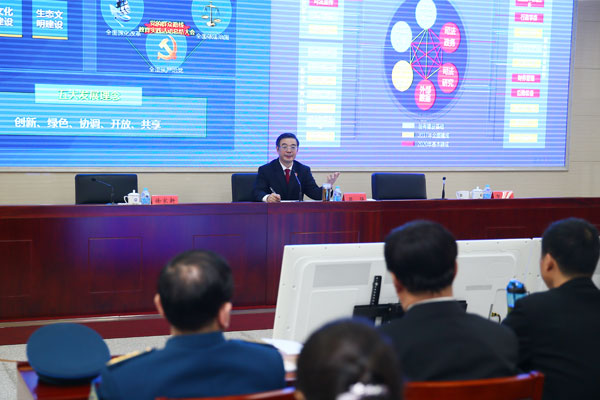SPC pushing forward modernization of judicial system, capability in an all-round way: top judge

China will push ahead with the modernization of its judicial system and capabilities in all aspects in a bid to provide strong judicial services and support for the country to attain its goal of building a moderately well-off society in an all-round way by 2020, said Zhou Qiang, president of the Supreme People’s Court, China’s top court.
Zhou made the remark in a lecture at the opening of the spring semester at the National Judges College on March 22.
Under the guidance of the central leadership, Chinese courts always adhere to the principles of serving the people and upholding judicial fairness and justice, and have been providing strong services and support for China’s economic and social development through their judicial functions, Zhou said.
However, Chinese courts still have a long way to go to adjust themselves to new situations and improve their capabilities in order to meet people’s increasing demands for judicial services, he said. He called on courts to work hard to modernize the judicial system and its capability to improve their services and boost competencies in backing the country’s development.
Modernization of the judicature and its capability – as part of the national strategy of modernizing the state governance system and its governance capability – conforms to China’s economic foundation and judicial principles. It is consistent with historical trends and the public’s expectations and essential to establishing a fair, efficient and credible socialist judicial system, said Zhou.
He urged courts at various levels to prioritize such modernization, push forward judicial reform and informatization plans and make greater progress in their development from a new starting point.
Zhou stressed deepening judicial reform in all aspects, especially the pilot reform programs with judicial accountability at their core, which seek to improve litigation rules, personnel management, court organization and the people’s jury system.
The top judge also called on courts to upgrade judicial procedures and increase transparency through making use of information technology to build “smart courts”. Online case handling should be promoted and supervision over judicial procedures enhanced, he said, suggesting that courts can offer judges smart services by taking advantage of big data resources.
He reiterated the goal of resolving problems that have led to difficulties in judgment enforcement within the next two to three years, through enhancing supervision and inspection and improving relevant punishment mechanisms.
Chinese courts will also step up construction of litigation service centers to provide fast and convenient access to the general public, Zhou added.
Attaining modernization of the judicature and its capability relies on team building, he said, vowing to build loyal, clean and accountable court teams with improved professionalism.
SPC Vice-President He Rong hosted the opening ceremony for the new semester. Other SPC officials and trainees including local court officials and judges were also present at the meeting.









